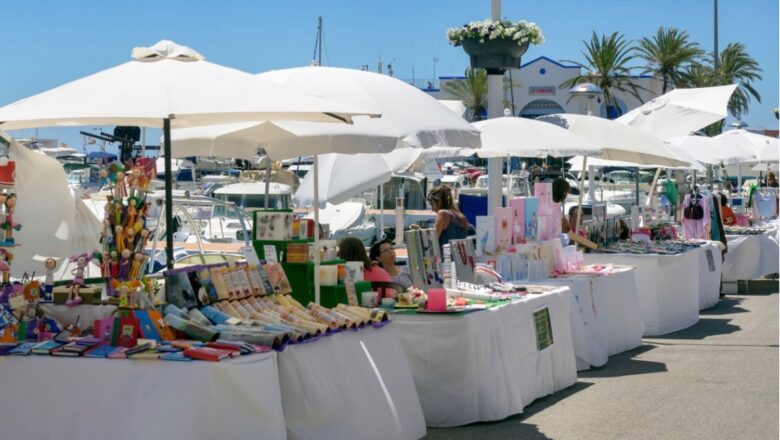If you’re planning a trip, you’ve likely wondered about tipping in Spain. The short answer is that Spain tipping is modest, not mandatory, and driven by good service rather than a set rule. This guide explains when tips are appreciated, how much to leave in restaurants, taxis, tours, hotels, and other services, and how the tipping culture differs from other countries. You’ll also learn useful Spanish words like por favor so you can leave tips gracefully and avoid an awkward moment.
If you’re ever unsure, round up the bill and say “gracias.” That’s the most common practice across the country.
Spain tipping etiquette basics (what most locals do)

Spain’s tipping culture is relaxed. Service workers earn wages, so a tip is a bonus rather than part of a person’s base pay, unlike in some other countries. People tip to say “thanks” when someone goes out of their way—helping with luggage, explaining a menu in basic words, or being attentive at a busy table. There’s no set rule or universal service charge policy, so common practice beats strict percentages.
- Cash vs. card: Cash is easiest for leaving a small tip. Card terminals sometimes allow tips, but not always, and the staff may not receive them immediately.
- Service charge vs. tax: IVA (VAT) is included in the menu prices and shown on your bill. A separate “service charge” is rare; if you see “servicio incluido,” you don’t need to add more unless you want to reward exceptional service.
- Staff share tips: Many restaurants pool tips so kitchen staff and other staff share tips, but policies vary by venue and region.
- Cultural note: Tipping expected is not the norm; a small tip is appreciated for good service and a slightly more generous tip for exceptional service is a nice gesture.
How much to tip in Spain by situation
Restaurants with table service (lunch and dinner)
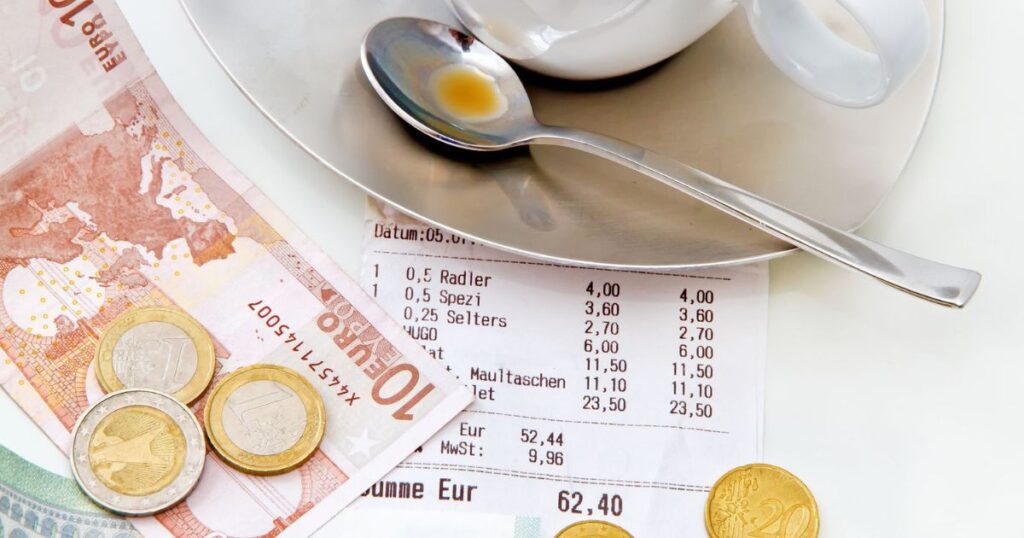
In restaurants with full table service, most locals either round up to the next euro or leave a small tip only when they feel the waiter delivered good service. For fine dining or special occasions, a generous tip can reach up to 10%, but it’s not a default.
- Modest meals (25–40€): Leave 2–4€ if you enjoyed the service.
- Mid-range (40–80€): 3–8€ is common for good service.
- Fine dining (80€+): Up to 10% only for exceptional service.
- How to leave it: Put cash on the table after you pay the bill or hand it discreetly to the waiter with a “Para ti, gracias.”
- Kitchen staff: If you hope the kitchen staff also benefit, ask discreetly if tips are pooled.
Tapas bars, chiringuitos, pintxos, and casual spots
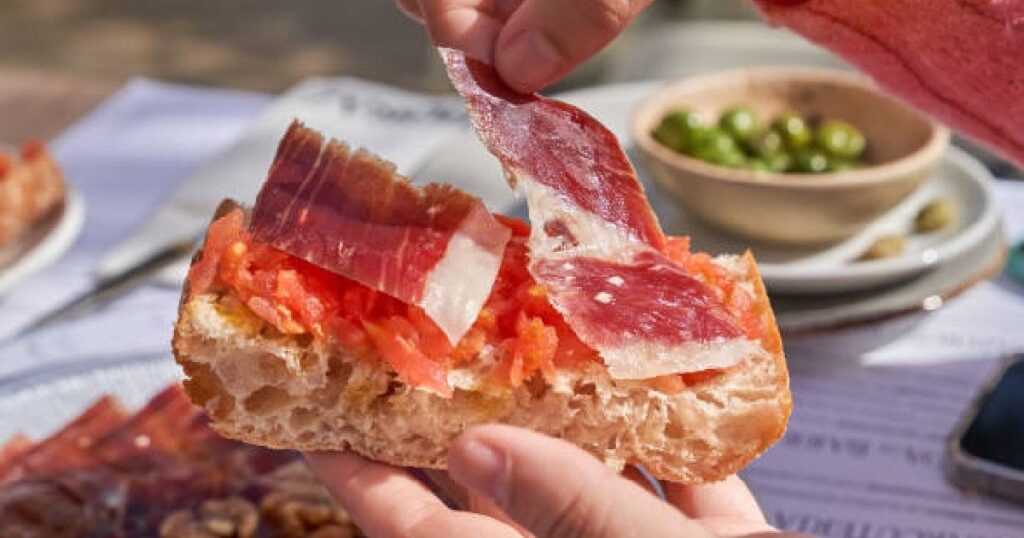
Tapas bars, beach bars and pintxos counters are about speed and small plates. Tipping etiquette is lighter and tied to rounds of drinks and bites instead of a formal table service course structure.
- Standing at the bar: Leave a few coins per round of drink and food.
- Table service at tapas bars: Round up or add 1–3€ if staff kept the drinks and food flowing.
- San Sebastián and Basque Country: In pintxos bars, a small tip is appreciated, but the common practice remains modest.
Cafés, bakeries, and coffee‑to‑go
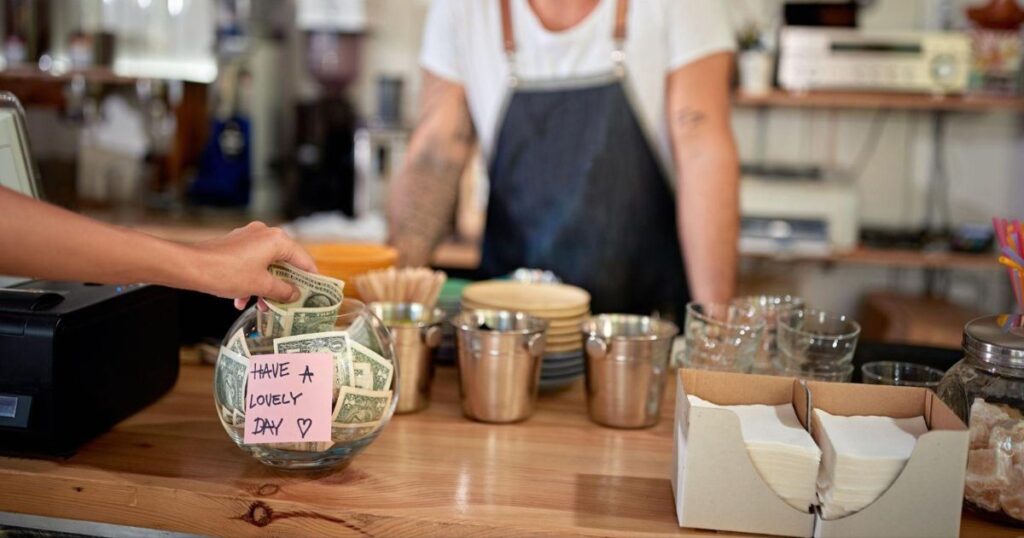
Counter service is quick and friendly, and tipping is minimal. If someone customizes your drink or helps with dietary questions, consider a small tip.
- Coffee or pastry at the counter: Toss a few coins in the jar for friendly, fast service.
- Sit‑down café table service: Round up or leave about 1€.
Taxis and ride‑hailing: how to tip taxis in Spain
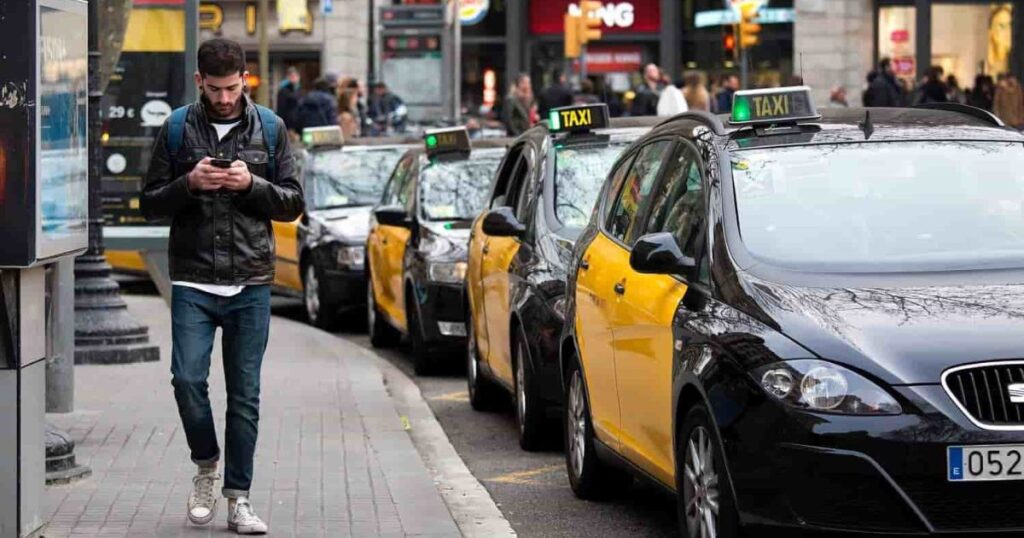
Tip taxis in Spain by rounding up the fare. Tipping taxi drivers isn’t a strict expectation, but it’s an easy way to reward helpfulness and a smooth ride.
- Typical approach: Round up to the nearest euro or add 5–10% for exceptional service.
- When to add more: Help with heavy luggage, child seats, late‑night rides, extra stops, or when the driver’s local advice saves time and money.
- Handy phrase: “Quédate con el cambio, por favor.” (Keep the change, please.)
- Hidden fees: Some cities apply supplements for airport rides, night hours, or luggage. Check the meter, the printed rate card, or your app to avoid surprises on the bill.
Hotels and accommodation (including room service)

Hotel tipping is modest and tied to specific tasks. Use small notes and coins so the right person receives the tip at the right time.
- Luggage/porter: 1–2€ per bag, depending on weight and effort.
- Housekeeping: 1–2€ per day; leave daily so the correct person receives it. Add more if you requested extra cleaning or frequent room service.
- Concierge: 5–10€ for hard‑to‑get reservations, event tickets, or special arrangements.
- Room service: If no service charge is listed, 1–3€ is a nice gesture.
Tours and activities (tipping tour guides on free and paid tours)

Tipping tour guides varies by format. Free tours operate on tips; paid tours welcome a small tip for good storytelling, logistics, and safety.
- Free tours / walking tour: 10–20€ per person depending on length, group size, and quality.
- Small group tour: 5–10€ per person if you enjoyed it.
- Private tour guide: 10–20€+ per person for exceptional service or customized itineraries.
- Driver + guide: If there’s a separate driver, consider a few euros for the driver as well.
Spas, salons, deliveries, and other services

For other services, rounding up or a small tip is appreciated, especially when someone goes the extra mile.
- Hairdresser/barber: Round up or 5–10% if you love the result.
- Spa/massage: 5–10€ for exceptional service; otherwise rounding up is fine.
- Food delivery/couriers: 1–2€ if they climbed stairs or braved bad weather.
Quick reference table: Spain tipping by service
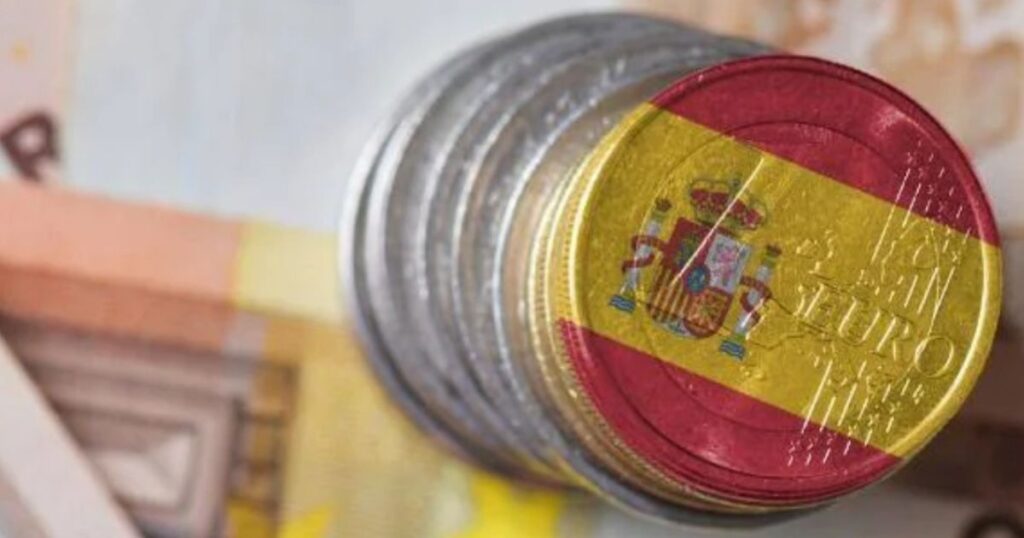
| Service | When to tip | Typical tip | Notes |
|---|---|---|---|
| Restaurants (table service) | Good or exceptional service | Round up or up to 10% | Fine dining may merit up to 10% for exceptional service |
| Tapas bars/pintxos | Per round or table service | A few coins to 1–3€ | Standing at the bar = smallest tips |
| Cafés/bakeries | Counter or sit‑down | Coins or ~1€ | Jar tipping is common but optional |
| Taxi driver | Helpful service | Round up or 5–10% | Say “Quédate con el cambio” |
| Hotels—porter | Per bag | 1–2€ per bag | Tip more for lots of stairs/heavy bags |
| Hotels—housekeeping | Per day | 1–2€ per day | Leave daily; staff may rotate |
| Concierge | Hard‑to‑get help | 5–10€ | For reservations or tickets |
| Room service | If no service charge | 1–3€ | Check if “servicio” is listed |
| Tour guide—free tour | Per person | 10–20€ | Free tours rely on tips |
| Tour guide—small group | Per person | 5–10€ | More for exceptional storytelling |
| Private tour | Per person | 10–20€+ | Add for driver if separate |
| Salons/spas | If very satisfied | Round up or 5–10€ | Optional, appreciated |
| Deliveries | Extra effort | 1–2€ | Coins are convenient |
Regional nuances: Barcelona tipping, San Sebastián, and other regions

- Barcelona tipping: In a city with many international visitors, staff are used to tips, but most locals still keep it modest. In tapas bars, a few coins per round is normal; in full‑service restaurants, round up or leave a few euros for friendly, efficient table service.
- San Sebastián and the Basque Country: Pintxos culture emphasizes quick service and self‑directed ordering. People tip small amounts per order or when paying the final bill, even at high‑end spots. A generous tip appears mainly for exceptional service.
- Madrid, Valencia, Seville, and other regions: The same general rule applies—round up, leave a small tip for good service, and don’t feel pressured. Tourist corridors may feel more “tip‑forward,” but most locals remain modest.
- Islands, Marbella and resort areas: All‑inclusive or half‑board hotels may include a service charge or automatic gratuity for room service. Tips go to individuals who provide standout service, like a bartender who remembers your drink or a waiter who coordinates multiple courses smoothly.
Bills, payments, and avoiding hidden fees
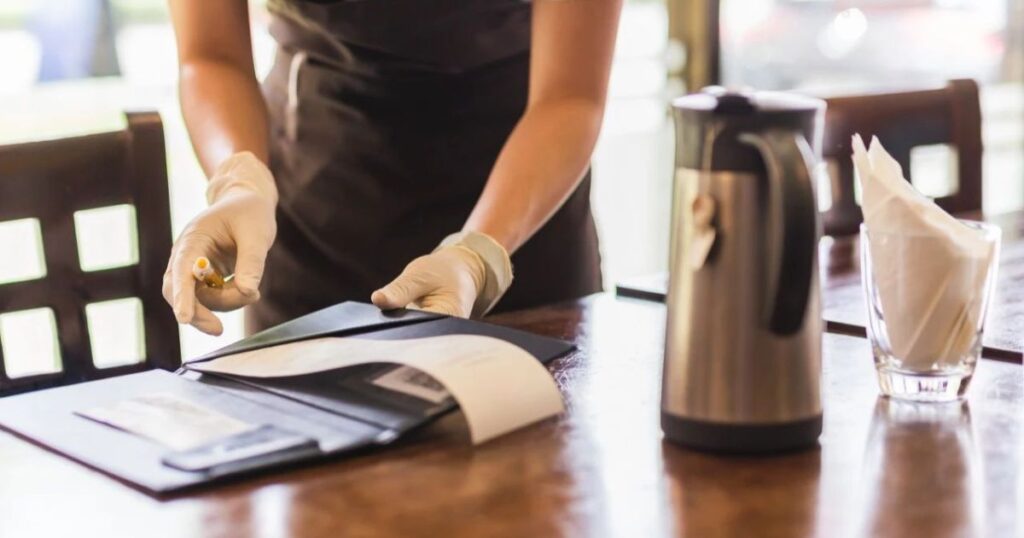
Understanding the bill helps you feel confident when you pay and leave a tip. Spain’s price transparency helps: taxes appear clearly, and “service charge” lines are uncommon outside of specific venues.
- IVA included: In Spain, IVA is included in menu prices and summarized on your bill (ticket or factura). You don’t tip on tax; if you tip, base it on your overall satisfaction with the service.
- Service charge: A separate service charge is rare. If you spot “servicio incluido,” consider you’ve already paid for service. You can still leave a tip for exceptional service if you wish.
- Card vs. cash: Ask “¿Puedo pagar con tarjeta?” Some terminals offer a tip line; others don’t. Cash ensures the person who served you receives it.
- Foreign currency: Don’t leave tips in foreign currency. Use euros; foreign notes or coins are often unusable for staff.
- Taxi supplements and hidden fees: Airport surcharges, night rates, or luggage fees may be included according to city regulations. Check the rate card to avoid surprises and unnecessary extra money.
How to tip in Spanish (basic words and polite phrases)
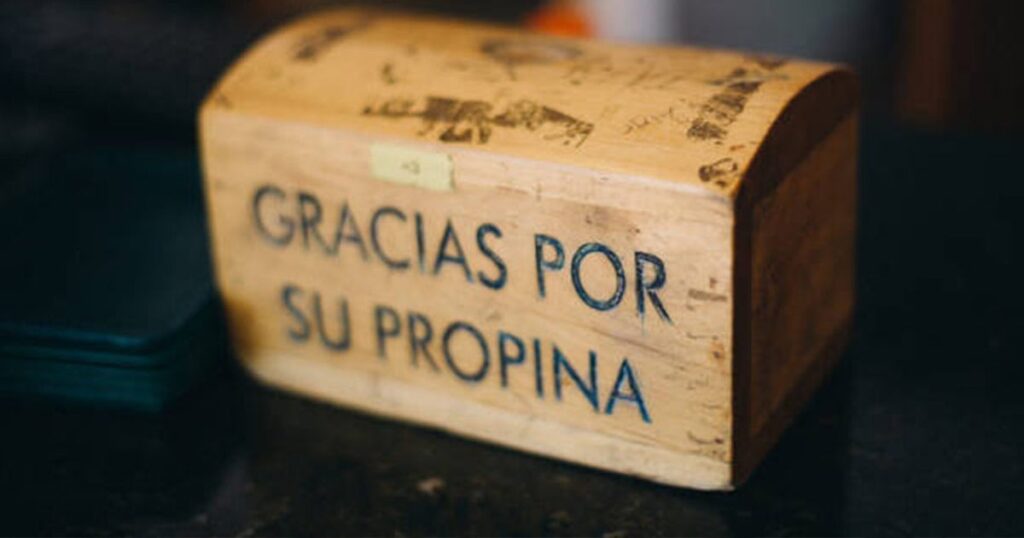
Being polite and clear is often as valuable as the money. These basic words reduce friction and show respect for the culture.
- Por favor = please
- Gracias = thank you
- Para ti / para usted = for you
- Muy buen servicio = very good service
- Quédate con el cambio = keep the change
- La cuenta, por favor = the bill, please
- ¿El servicio está incluido? = Is the service charge included?
Tip‑friendly scripts:
- Restaurant cash tip: “La cuenta, por favor.” After paying, “Para ti, gracias. Muy buen servicio.”
- In a taxi: “Gracias por el trayecto. Quédate con el cambio, por favor.”
Spain vs. other countries: What’s different about tipping culture?

Spain’s tipping etiquette is firmly in the “modest tip” camp compared with several other countries. Most people leave tips to reward good service, not as an automatic surcharge on every bill.
| Country/Region | Typical Restaurant Tipping | Cultural Drivers |
|---|---|---|
| Spain | Round up or small tip; ~10% only for exceptional service | Wages + IVA included; relaxed tipping culture |
| U.S./Canada | 15–20%+ often expected | Lower base wages; strong tipping norms |
| Northern/Western Europe | Round up or ~5–10% | Similar to Spain; modest tips common |
| Some Asian countries | Often no tipping | Tipping may be uncommon or even discouraged |
Why the difference? Wages are structured differently, prices include taxes, and culture favors simplicity. People tip to reward good service, not because of a rigid set rule from their home country.
Do’s and don’ts to avoid awkward moments
Do
- Carry small cash and a few coins for quick tips.
- Reward good service or when someone saves you time.
- Use polite Spanish words and be discreet when you leave a tip.
- Check if staff share tips when you’re planning a larger tip on card.
Don’t
- Feel forced to leave a large tip when service was average.
- Leave foreign currency; it may be unusable.
- Over‑tip in tourist zones just because others do.
- Confuse service charge with tax; IVA is standard and already in the price.
Insider tips to reward good service without over‑tipping

- Praise by name: A quick “Muy buen servicio” while mentioning your waiter or tour guide by name goes far.
- Leave a positive review: Mention the person on Google Maps or the venue’s page; social proof helps careers in Spain’s service industry.
- Become a regular: In cafés and tapas bars, a small tip each round builds rapport. Staff often remember your drink or favorite food.
- Small group tours: Tip the tour guide directly at the end so it stays with the person who delivered the service.
- Keep it simple: Use basic words and smile. Good manners prevent the awkward moment more than extra money does.
Money tips: cash, cards, and travel practicalities
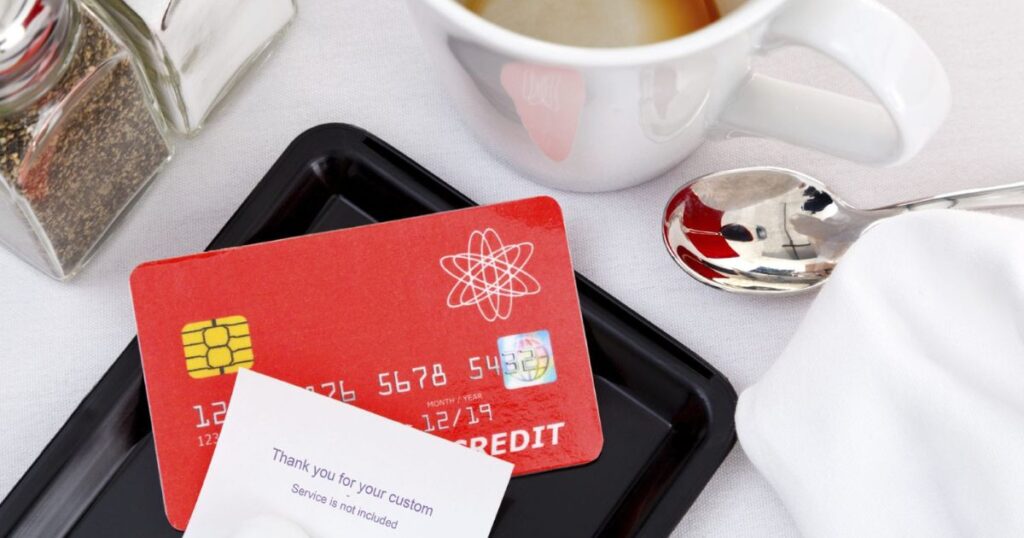
- Always carry coins and small notes: Spain is still very cash‑friendly for tips, especially in bars and taxis.
- ATMs: Use bank ATMs to avoid hidden fees. Decline dynamic currency conversion (DCC) on the machine or terminal.
- Travel insurance: Consider a policy that covers lost cards or cash so you can carry a little extra money for tips without stress.
- Safety basics: Split funds between your wallet and hotel safe. Don’t flash cash when you pay the bill.
Fast answers (FAQs) about tipping in Spain
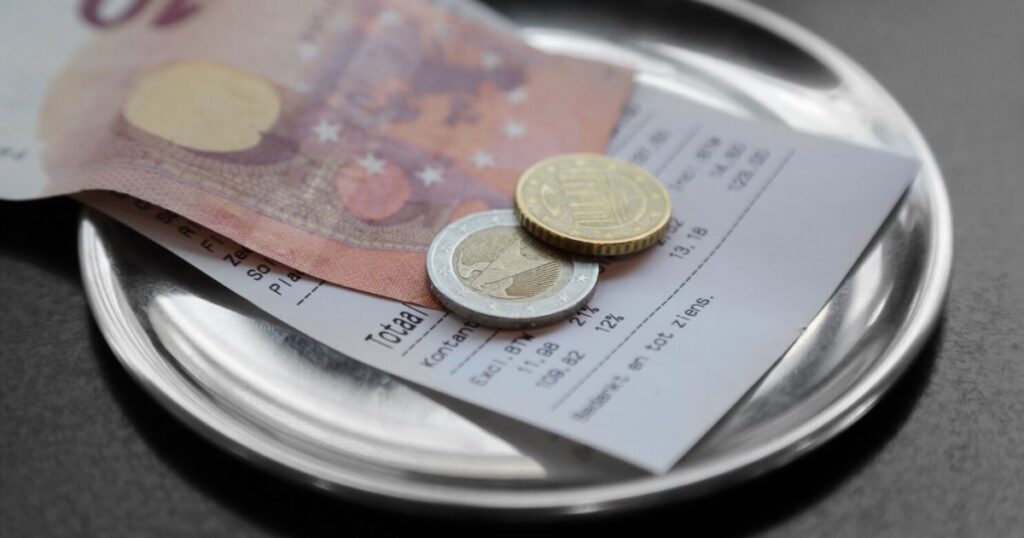
Do people tip in Spain?
Yes. People tip modestly for good service. It’s appreciated, not strictly expected.
Is tipping expected at restaurants?
Not as a set rule. Round up or add a few euros for table service when you’re pleased, and consider up to 10% only for exceptional service.
How much do I tip a taxi driver?
Round up or add 5–10% if the taxi driver helps with luggage, takes a great route, or provides exceptional service.
Should I tip for room service?
If no service charge is listed, 1–3€ is fine. If a room service fee is already on the bill, tipping is optional.
What about free tours and walking tours?
Free tours rely on tips. For a good walking tour, 10–20€ per person is common. For a small group or private tour guide, tip more for exceptional service.
Can I tip with a card?
Sometimes. Ask if the terminal accepts tips and whether staff receive them. Cash is simpler and more direct.
Do staff share tips with kitchen staff?
Many venues pool tips so the kitchen staff and other staff share tips, but policies vary. Ask discreetly if it matters to you.
What’s a generous tip in Spain?
In restaurants, 10% is considered generous. In hotels and tours, a few euros or 5–10€+ for standout service is appreciated.
Is there a service charge in Spain?
It’s rare. If you see “servicio incluido,” you don’t need to add more unless you truly received exceptional service.
Sources and further reading (authority sites)

- Spain’s official tourism site: https://www.spain.info
- Barcelona Turisme (official): https://www.barcelonaturisme.com
- Madrid Destino (official): https://www.esmadrid.com
- Marbella Guide: https://marbelladreamvillas.com/blog/
- OCU (Spanish consumer organization) on bills/IVA: https://www.ocu.org
- General travel guidance from recognized guides (e.g., Lonely Planet, Rough Guides, Travelers Mag)
Conclusion: The easy way to handle tipping in Spain

Tipping in Spain is simple once you know the culture. Tips are appreciated, not required, and a small tip—rounding up, a few coins, or a few euros—is the common practice to reward good service. For restaurants with table service, add a bit more only for exceptional service; for taxis, tours, room service, and other services, keep it modest and use cash when possible. If you remember one general rule, it’s this: follow local cues, keep tips small, and leave a tip when you genuinely want to reward good service. With this approach to tipping in Spain, you’ll fit the culture, avoid hidden fees and awkward moments, and feel confident from Barcelona to Marbella and other regions across the country.
